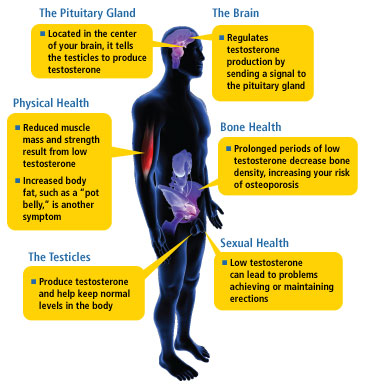What are the Signs & Symptoms of Low Testosterone in Men?
Author: Brian Hildebrandt, Last Updated: Aug 17, 2018
Identifying low testosterone symptoms and following up with proper treatment can have profound effects on quality of life.
This is mainly due to our mental, physical, and emotional health being highly dependent on adequate testosterone levels.
Testosterone deficiency can therefore cause a breakdown in bodily function, often subtly, as a man advances in age.
This deterioration can manifest as seemingly unrelated ailments (fatigue, depression, sexual dysfunction, back pain, heart disease, etc…) that often times goes unnoticed.
Physical Signs and Symptoms of Low T

- Erectile dysfunction (impotence: inability to develop or maintain an erection)
- Fatigue (lack of energy)
- Muscle mass and strength (reduced)
- Body fat (increased)
- Back pain
- Osteoporosis development (reduced bone mass/density and increased risk of fracture)
- Heart attack risk (higher incidence of sudden death)
- Cholesterol (high: especially LDL/HDL ratio)
- Refractory period increased (time it takes to have sex again)
- Sperm count (reduced fertility)
- Gynecomastia (development of male breasts)
Mental Signs and Symptoms of Low T
- Libido decreased (lowered sex drive)
- Brain fog (difficulty concentrating)
- Memory problems
Emotional Signs and Symptoms of Low T
- Depression (sadness, hopelessness, despair)
- Motivation and ambition (decreased)
- Irritability (increased anger, agitation, or loss of patience)
The age at which an androgen deficiency first appears can vary greatly among men. There are no hard fast rules.
Some men feel great in to their 70’s. Conversely, a minority may need testosterone replacement therapy in to their 20’s or even teens.
No two people are alike. Just because you’re young, doesn’t necessarily mean your testosterone levels are on par. It is just more likely!
Low Testosterone Symptoms Related to Age

For optimal health, most progressive doctors today aim for T levels around the average 25 year old (750 ng/dl or 26 nmol/L).
This can help you manage the symptoms of male menopause, allowing you to perform to the greatest of your ability well in to old age.